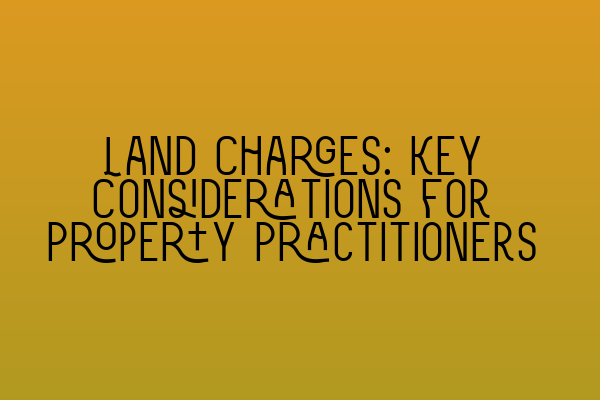As a property practitioner, understanding land charges is crucial in order to effectively advise clients on property transactions. Land charges refer to any interests or rights that burden a property and can affect its value or use. These charges are registered against the property and can have significant implications for both buyers and sellers.
Types of Land Charges
There are various types of land charges that property practitioners need to be familiar with:
- Restrictive Covenants: These are obligations that restrict the use or development of land. They are typically created to maintain the character of an area or protect the interests of neighboring landowners. It is essential to consider any restrictive covenants as they may limit the potential use of the property.
- Easements: Easements grant certain rights over another person’s land. Common examples include rights of way, rights of light, and rights to access services such as drainage or utilities. When advising clients on a property, it is important to identify any easements that may affect their rights or obligations.
- Charges: Charges refer to financial obligations secured against a property, such as mortgages or loans. When dealing with a property sale or purchase, it is crucial to investigate any charges registered against the property to ensure the buyer is aware of the financial liabilities.
- Notices and Restrictions: Notices and restrictions are registered against a property to protect third-party interests. Notices can be registered by local authorities for purposes such as planning enforcement or tree preservation. Restrictions, on the other hand, restrict certain actions, such as the disposal of the property without the consent of a specific person or authority.
Each type of land charge has its own implications and procedures for registration and removal. It is essential for property practitioners to have a comprehensive understanding of these charges to provide accurate advice to clients.
Considerations for Property Practitioners
When dealing with land charges, property practitioners need to consider the following:
1. Conducting Searches
As part of the due diligence process, it is crucial to conduct thorough searches to identify any registered land charges. This involves examining the Land Charges Register, Local Land Charges Register, and other relevant databases. By conducting these searches, property practitioners can uncover any potential issues that may affect the property transaction.
2. Assessing the Impact
Once land charges have been identified, property practitioners need to assess their impact on the property and advise clients accordingly. For example, if there is a restrictive covenant prohibiting certain types of development, clients may need to adjust their plans or negotiate with the affected parties to remove or modify the covenant.
3. Dealing with Charges
If there are charges registered against the property, property practitioners need to ensure these are properly addressed during the transaction. This may involve liaising with lenders to obtain discharge statements or ensuring that new charges are properly registered if financing arrangements are involved. It is crucial to ensure that charges are released or updated to avoid any future complications for the client.
4. Compliance with Legal Requirements
Property practitioners must ensure compliance with legal requirements when dealing with land charges. This includes understanding the relevant legislation, deadlines for registration or removal, and any specific procedures that need to be followed. Failure to comply with these requirements can have severe consequences for the client and may result in legal disputes.
Conclusion
Land charges play a significant role in property transactions, and property practitioners must have a solid understanding of the various types of charges and how they can impact their clients. By conducting thorough searches, assessing the impact of land charges, dealing with charges appropriately, and ensuring compliance with legal requirements, property practitioners can effectively navigate the complexities of land charges and provide valuable advice to their clients.
If you found this article helpful, you may also be interested in the following related articles:
- Understanding Contractual Capacity: Rights and Limitations
- Interactive SQE Mock Tests for Contract Law: Test Your Knowledge
- Join Our SQE Contract Law Webinars: Expert Insights and Guidance
- SQE Prep: Mastering the Essentials of Contract Law
- Contractual Capacity: Understanding Legal Competence in Contracting Parties
